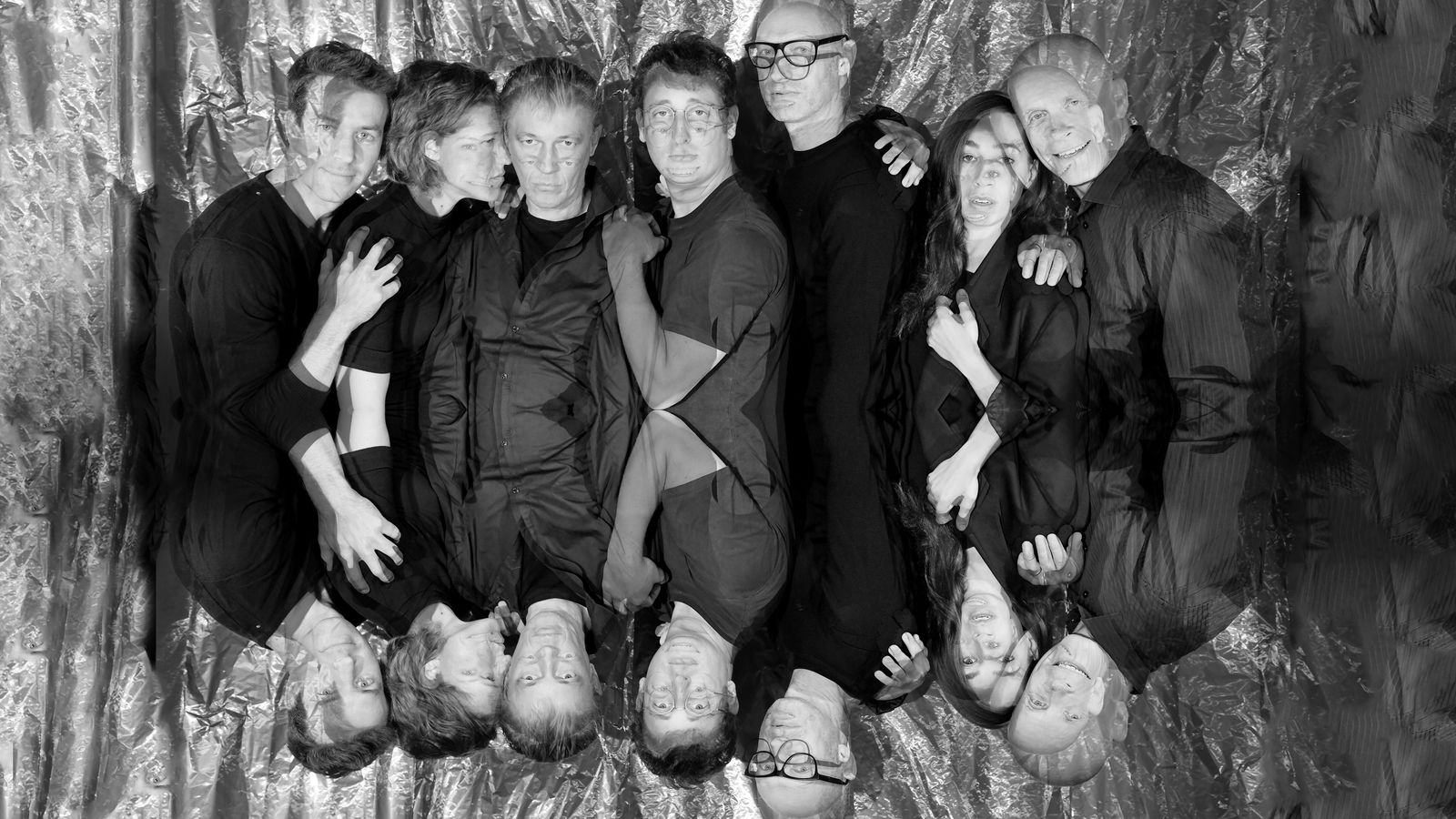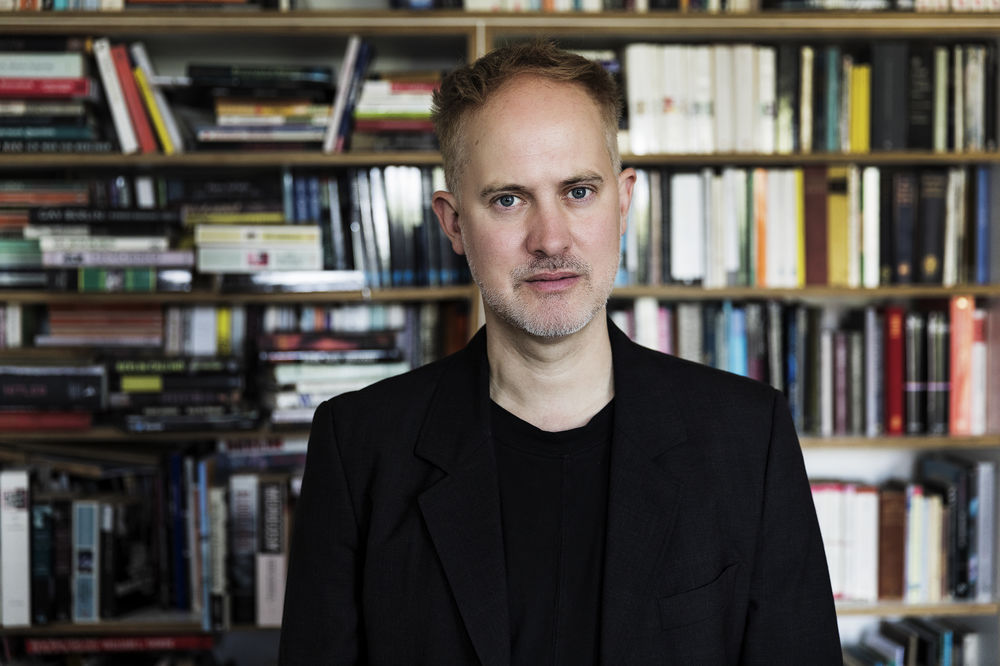
Playing Lego with Herbert Fritsch
by Joseph Pearson
4 October 2019
Herbert Fritsch and I sit on a park bench with a voice recorder between us. A wiry and bright-eyed man, he’s electrified as his production of »Amphitryon« comes together. But this time, he tells me, he is doing things differently.
»This is the first time I am so fluid in my work. That I am not confined by a strong formal structure.«
I think about other Fritsch productions at the Schaubühne and their controlled worlds: »Zeppelin«, where the enormous cage of a blimp is a precise grid from which actors hang and tumble. Ödon von Horváth’s theatre is deconstructed to an opera of minimal sounds. Or »Null« with its careful patter of language as the actors move in a percussive ballet. Both were tightly choreographed productions.
I tell Fritsch, »From what I saw today in rehearsal, this production appears to be the opposite of ›Zeppelin‹. You make few alterations to Molière’s text and you put aside a predetermined choreography«.
»Exactly«, he replies, »I am reacting and refuting this strong form of directing. Compared to ›Zeppelin‹, here is there is more flexibility«.
The morphology of the stage gives the actors options. Decked with banners that recess, the stage design is by Fritsch himself. Each banner indicates one of many entrances (»Gassen«) to the wings leading off-stage. There’s a surprise element: who knows where or when an actor might appear? And the suggestion of an infinite recession resembles a double mirror but in bright colours. It is neither metallic nor cold, but playful. This design, with its entrances, is a nod to the Baroque stage and the 17th-century origins of Molière’s play.
Fritsch fans will not be disappointed. The actors still act like Fritsch creations: as if they are plugged into an electrical current, whose voltage sometimes jumps, forcing a joyful gesticulation or an awkward expression. The marimba and piano play a live, pulsing, counterpoint. But Fritsch encourages the actors and musicians to follow their intuition when delivering the text. They experiment with swift improvised changes in dramatic style: from melodrama to murder mystery, to romance. I watch the ensemble practice the same scene in rehearsal in two or three different ways: once fast and angry – as if bathed in amber light – one character punishing the other. Then the next is a love scene, which I can imagine tinted in hot pink. The improvised possibilities are video-recorded for the actors to reexamine what was most successful.
Fritsch explains, »It’s as if I’m using different colours. The quick changes in theatrical style that the actors improvise could be described as a ›Theatre-mosaic‹. A play of perspectives, of colours, and their resulting different meanings. They are filters through which you can see the scene differently«.
»And how does the live music play into this game?«
»I like to quote Duke Ellington: »It don’t mean a thing if it ain’t got that swing«. The more that you pay attention to the music, to rhythm, the more one can pay attention to the content«.
»But if the actors are improvising freely on a stage, playing with different deliveries, and the music is running free… how do you balance all this improv with your desire to have a structured, well-made piece?« I ask.
»You are asking about boundaries, the limits of freedom in the piece. There are two levels to think about here: first speech, and then movement and the ability to react quickly. The actors have developed a choreographic catalogue from which they can draw. I think of the Commedia dell’arte. Arlecchino knows what his moves are and can use them when appropriate. I like to think of these limits as Lego, as pre-fabricated pieces that can be placed at will: Legoschauspielerei.«
But what do his actors think of this? Is there such a thing as too much freedom from the director?
I ask one. Annika Meier replies: »Freedom and direction are not mutually exclusive. The energy comes from the director, music and colleagues. All these influence my acting, and the remaining freedom is absolutely necessary to clear one’s mind.«
Meanwhile, Frisch replies that giving up control is, »Fun, but risky. But we have to try it out«.
»I imagine that it’s not just the actors that feel a sense of freedom«, I say.
»I am learning another way to work with actors, to give them a lot of trust. But I should add that in the other pieces, it was not a matter of only controlling them. In rehearsing, they must develop a conscious, practiced form, that is their own«.
**
»Amphitryon«, performed in 1668, was immediately a great success. It was Molière’s only foray into the world of Greek mythology, as recounted by Plautus, and the piece brings Gods to earth to meddle with mortals’ fates. Zeus wishing to make a sexual conquest takes the form of a husband who is away at war to seduce a newlywed wife. Mercury accompanies the King of the Gods, taking the form of the husband’s page. The comedy ensues when the two mortals return from war to find that doubles have taken their places.
»This is your second production from the French dramatic repertoire at the Schaubühne, after Feydeau’s »Champignol Despite Himself«, and you have already produced five Molière plays elsewhere. What in particular does this tradition offer you?« I ask Fritsch.
He replies, »The thing about these pieces is the swiftness they have. This pace is something that Feydeau inherited from Molière, in the dialogue and the plot. A lot is said and it’s said in a complicated way. That’s what’s so lovely about it«.
»I would like to explore the doubling of man by god, which is at the centre of the play – « I begin.
»Yes, the question of the oldest of comedic principles: the Doppelgänger. I think of it as the foundation (›Grundstruktur‹) of the comedy. It’s almost like a Pythagorean principle«.
When I think about the Doppelgänger, I can’t help but think of the Schubert song (and Heine’s poem) and its associations with angst and existential insecurity. The double confronts us with the problem of our ontology; it brings into question the presumption of the uniqueness of our self. There is the superstition that seeing the Doppelgänger foretells one’s death, as a fateful experience of observing oneself from outside – »an out of body« experience, so to speak – as if one were at one’s funeral. Yet, the Doppelgänger can also be a source of great comedy. So I ask, »How do we explain the comedic side of doubling?«
»When we laugh at the Doppelgänger, we are laughing at recognizing ourselves, and with this we find relief. From a distance, we can confront with lightness the basic problems that we have. It’s as if we are standing on a mountain, and looking down. Seeing all these people with their problems, we might see the sadness of human life. But we can also gain something from this distance«.
»It’s also the distance between humanity and the Gods, no?« I ask.
»Genau. This confrontation is appealing: that for the Gods, everything is permitted. And then we have these poor people beside them. But there is something beautiful in this piece in that we don’t choose between the pain of man and that of the gods. Even the gods can hurt and have problems, even if they are gods. There’s no great difference between man and mortal. Even the King can be hurt.« And here he refers to how Molière’s play is interpreted as a parody of Louis XIV, the god of his realm.
»The doubling of characters, of course, also provides opportunities for staging …«.
»I have worked with the question of doubling before, in my production of »A Comedy of Errors« for example. I find the question intriguing: rather than present characters that look the same, can we make the audience believe that two characters who look very different from one another are the same person? One big, one small, for example? Or when one goes out and comes back as the other? You can begin to play in ways with doubling that are not obvious. Our fantasy of what we wish to see can overpower us and it can be charming«.
As we walk back to the practice stage, we pass the actors all sitting on a picnic table in the car park. They face each other smoking, mirrored it seems in their gestures, all still in costume. »Time to get back to work« says one, and they all get up at once.
I’m on my way to the U-Bahn but I look back at them. There is the obvious thought about how the stage is a mirror to our experiences. But this observation is complicated if one thinks about selfhood in 17th-century France. Allow me a excursus into early-modern philosophy of identity. Blaise Pascal, for one, describes looking up from the street to an open window, where he sees a man. Is that the self up there? Is that contemplation of another self better than – as Descartes would have it – an endless game of teasing ourselves out from the inside? Do we not need a mirror to see ourselves?
Amphitryon
by Molière
Direction and Set Design: Herbert Fritsch
Premieres on 13 October 2019
Mit dem Aufruf des Videos erklären Sie sich einverstanden, dass Ihre Daten an YouTube übermittelt werden. Mehr dazu finden Sie in unserer Datenschutzerklärung.
Bei Klick auf die Schaltfläche "Akzeptieren" wird ein Cookie auf Ihrem Computer abgelegt, so dass Sie für die Dauer einer Stunde, diese Meldung nicht mehr angezeigt bekommen.
Pearson’s Preview

Archive
April 2024
Icy Myths in the Russian East
The Exiles of KnAM’s »My Little Antarctica« at the Schaubühne
April 2023
FIND 2023
Nostalgic, Not Sentimental
The Wooster Group as »Artist in Focus« at the Schaubühne
| Page 1 of 10 pages |
